Sept 2021 2nd edition
Sept 2021 2nd edition Londekile
Translations
Afrikaans
isiNdebele
isiXhosa
isiZulu
Sepedi
Sesotho
Setswana
Siswati
Tshivenda
Xitsonga
Chefs with Compassion continue to serve the hungry
Chefs with Compassion continue to serve the hungry UrsulaAteam of chefs are ensuring that no one goes hungry by forming Chefs with Compassion.
This is a non-profit organisation, comprising individuals, companies and organisations that rescue surplus food that normally goes to waste. Chefs with Compassion donates the food to kitchens to be cooked and distributed to the hungry.
“It’s a shocking fact that 10 million tonnes of food goes to waste every year in South Africa. That means one-third of all the food produced is waste – that is more than enough to feed the 19 million people going hungry across the country,” explains Chefs with Compassion General Manager Marion Tanzer.
The food rescued from the Joburg Produce Market, local farmers, food manufacturers, wholesalers and retailers is taken to the share house in City Deep for sorting. This is to ensure that good quality food reaches the Chefs with Compassion kitchen.
Produce unfit for human consumption goes to composting and pig farmers. After the food has been collected, it is prepared by the cooks, caterers and chefs from the 29 beneficiary organisations.
“The third and final part of our mission is to ensure the meals reach those most in need, through our approved beneficiary organisations.
“Our greatest wish is to alleviate the hunger and suffering in South Africa,” says Tanzer.
Themba Mbatha-Chalumbira of One Moment Foundation was delighted to be one of the beneficiaries to receive food from Chefs with Compassion.
“We received large donations of vegetables and utensils from Chefs with Compassion, which helped us maintain our soup kitchen that feeds over 200 homeless people daily, including children from informal settlements in Berea in Johannesburg.”
Restaurant owner Thandi Dyantjie, from Germiston, was uneasy seeing people go without food at the start of the lockdown.
“I saw people struggling. They could not get food. I chose to make a difference and started a soup kitchen, with help from my staff, family and Chefs with Compassion,” she says.
Tanzer invited companies in the agricultural, manufacturing, distribution and retail industries to share their surplus produce with Chefs with Compassion.
To register as a kitchen or a beneficiary, visit cwc.org.za to complete a form.
Don't be fooled by fake news
Don't be fooled by fake news UrsulaGovernment is calling on South Africans to dismiss fake news about the COVID-19 vaccines. 
The Johnson & Johnson and Pfizer Coronavirus Disease (COVID-19) vaccines, which are being rolled-out in South Africa, are safe for use, says the South African Health Products Regulatory Authority (Sahpra).
Before vaccines and other medicines are administered, they must pass safety standards.
Sahpra’s Head of Pharmacovigilance, Florah Matlala, says Sahpra is constantly monitoring the risk profile of the vaccines. The vaccines have a low-risk profile, with the benefits outweighing any potential side effects.
“There’s a careful and ongoing review of data received from pharmaceutical companies, based on the clinical trials.
“We also look at the clinical trials themselves,” says Matlala.
Health Minister Joe Phaahla has dismissed claims that the vaccines could lead to death.
“COVID-19 vaccines are safe and effective. Although they may not 100% protect against contracting the virus, they remain a better prevention weapon against the pandemic.”
All vaccines approved for use in South Africa are subjected to a rigorous scientific standard for safety, effectiveness and manufacturing quality.
The Minister adds that anyone contributing to the spread of misinformation is contributing to avoidable infections and deaths, and this is a crime.
The misinformation has led to a large number of South Africans not getting vaccinated, which the Minister says is slowing down the mission to reach full vaccination. The more people that vaccinate, the sooner COVID-19 can be defeated and South Africans can resume their normal lives.
“We call upon people to show patriotism and be the messengers of positive information, instead of creating vaccine hesitancy through fake news," he says.
Vaccines are safe
Some rumours creating doubt about the vaccines is that people died after receiving a jab. However, studies have not found a direct link between the vaccines and death.
Minister Phaahla says the World Health Organisation puts together data from different countries, reviews the information and shares it with countries around the world. This information is used to determine the safety of the vaccines.
Ezimbuzini informal traders get a makeover
Ezimbuzini informal traders get a makeover LondekileThirty-three informal traders, who previously operated under make-shift stalls at the Ezimbuzini Precinct in Umlazi, KwaZulu-Natal, now have a new and improved trading facility.
eThekwini Municipality has constructed an automotive hub and informal trading stalls, at the cost of R22 million. The development is the first of its kind in the country to house and formalise the informal trading sector.
The project forms part of the municipality’s efforts to accelerate the township economy.
“Umlazi is one of the critical economic nodes in eThekwini and the municipality will continue to invest millions to ensure that the economic spin-offs of the city are spread throughout the municipality,” says eThekwini Mayor Mxolisi Kaunda.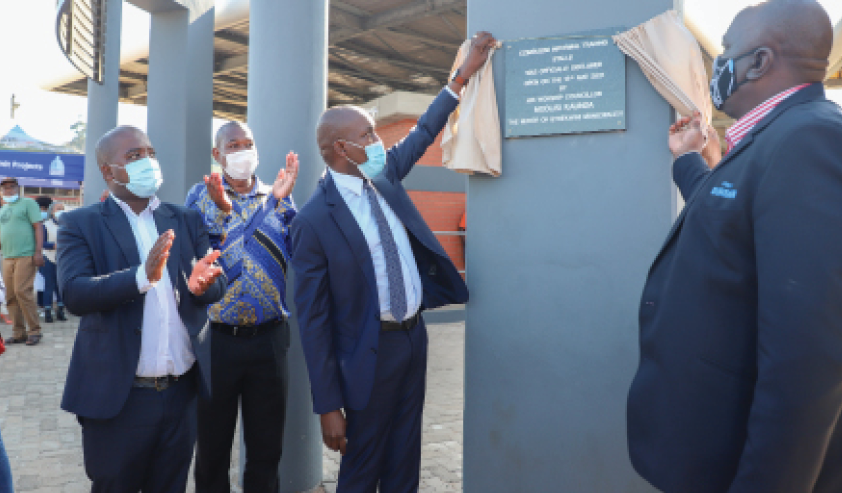
In keeping with the municipality’s Radical Economic Transformation Programme developed in 2018, eThekwini sub-contracted 16 local construction businesses for the project, creating 50 local jobs.
“This facility is in line with the government’s Industrialisation Strategy to support small enterprises, including black industrialists in townships and rural areas, to create decent jobs where people live,” says Kaunda.
The investment also supports locally produced goods and services and promotes the Buy Local Campaign.
Nelisiwe Zulu has had a stall for 12 years at Ezimbuzini.
“It’s always been a challenge trading here, especially on rainy days. People would avoid coming here because it was dirty, but now we have a beautiful and clean facility,” she says.
Another trader, Jacob Mngomezulu, says it is encouraging being part of the programmes eThekwini rolls out.
“There is nothing that makes you feel like the government is working, than witnessing development. This is what we call service delivery. We have seen it and we are looking forward to the business training we have been told about, which will see us do better trade,” he says.
Giving abuse survivors a second chance
Giving abuse survivors a second chance LondekileNomonde Ngwenya knows too well the devastating effects of abuse and has vowed never to return to that life again.
She is currently working hard to become a successful entrepreneur, with the help she receives from a non-governmental organisation (NGO) called 1 000 Women Trust.
Ngwenya who is from Cape Town in the Western Cape, is now the proud owner of a fish and chips shop.
“It gives me so much pride to be able to sustain myself. One of the reasons that made me continue to go back to my abusive partner was that he was the only one with an income and I was dependent on him. ”Thanks to the assistance of the 1 000 Women Trust, I can now provide for myself because I have an income,” says Ngwenya.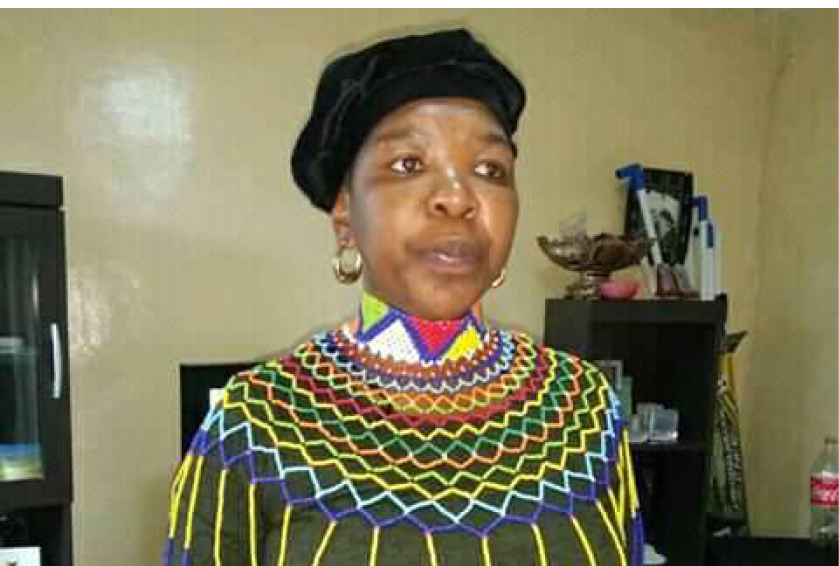
The NGO runs a programme called 1 000 Women Restart, which provides skills to women who have been abused and those who lost their jobs during the Coronavirus Disease (COVID-19) lockdowns.
The NGO started the programme to ensure that survivors of gender-based violence (GBV) do not find themselves going back to their abusers because of financial distress.
Spokeswoman for the 1 000 Women Trust, Tina Thiart, says their work is about empowering women with resources, skills, business mentorship and hope.c
“Our research shows that more than 52% of women in South Africa earn R1 183 per month or less. Furthermore, many women have suffered job losses during the COVID-19 pandemic, while many others were victims of GBV,” says Thiart.
Ngwenya has learnt about the accounting and tax compliance side of business, as well as how to sustain and manage her enterprise.
The 1 000 Women Restart Programme uses WhatsApp to provide advice and assistance to women who want to be self-sustainable.
Ngwenya encourages women to participate in the 1 000 Women Restart Programme because the organisation has created an environment where women can break the cycle of abuse and poverty.
Over and above access to business skills training and development opportunities, the women are mentored by business coaches and offered one-on-one sessions with business leaders.
Entrepreneurs who have participated in the 1 000 Women Restart Programme are also given the opportunity to market their businesses on the NGO’s social media pages.
To find out more about the 1 000 Women Restart Programme, visit www.1000women.co.za.
Gogo goes from leaky shack to fully furnished home
Gogo goes from leaky shack to fully furnished home LondekileThe first beneficiaries of the Siyanqoba Integrated Residential Development Programme recieve their new homes.
Gogo Martha Matjomane (70) of Siyangoba in eMalahleni is a the first-time homeowner, thanks to the Mpumalanga Provincial Government.
Matjomane is a widow, who has lived in a shack, with her four children, for 26 years.
“Rainwater leaked inside and my children and I were always stressed. Winter was unbearable in the shack,” she says.
Despite several unsuccessful applications, Matjomane was not dete-rred and kept applying for her new home.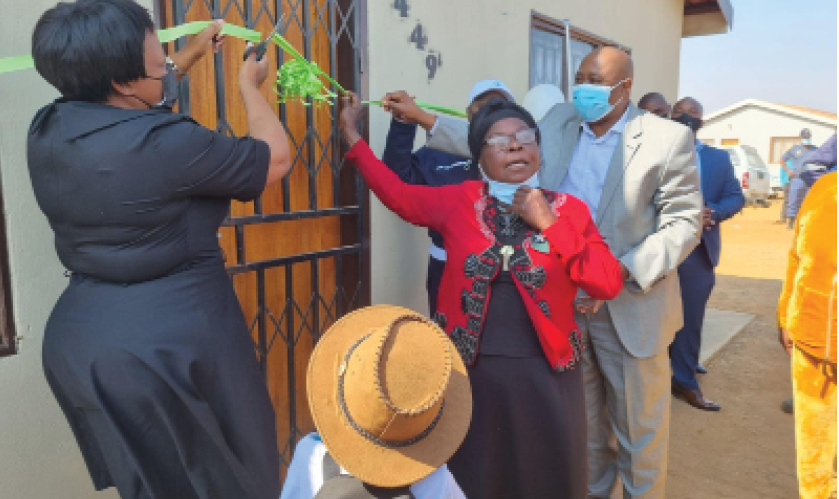
“In the end I finally received a house and I am truly grateful to have such a beautiful home. I pray that everyone else also gets help,” she says.
According to Mpumalnga Premier Refilwe Mntsweni-Tsipane, Matjomane was one of the residents who qualified for a fully furnished house from the provincial government.
“We handed over a fully furnished house to Mrs Matjomane because the conditions that she was living in were disturbing.
“She’s not the only beneficiary who recieved help from our government. We have a list of beneficiaries, in all municipalities across the province, and as soon as we finish building the houses we will hand them over,” she says.
The Premier adds that the elderly will be prioritised, followed by people with disabilities, child-headed households and then other community members.
Housing challenges
Mpumalanga MEC for Human Settlements Speedy Mashilo says residents' challenges with water and electricity are also being addressed.
“The municipality has started installing electricity cables in the area. The challenge arose when 300 electricity poles were burnt by the community during a service delivery protest. The water issue is being attended to by eMalahleni Local Municipality. This is a new development, so a lot of services will be rolled out,” he says.
Grandfather’s gift sparks passion for farming
Grandfather’s gift sparks passion for farming UrsulaLerato Tshabalala (32) fell in love with farming as a teenager, when her grandfather gave her a cow. 
“My grandfather was a subsistence farmer in Brooksby in Ditsobotla.
“As a child, he marked one heifer for me. Over the years, the cow has given birth to more calves,” says Tshabalala, who grew up in Driehoek in Mahikeng, North West.
She has a qualification in human resource management but struggled to find a job. In 2015, she decided to take farming seriously and turn it into a viable business.
“We spent a lot of time visiting my grandfather’s farm and my love for farming grew stronger every time,” she says.
With just 25 cows when she started her business, Tshabalala sold young bulls to buy more heifers to speed up the breeding process. Today, she has 76 cows.
While she specialises in cattle, she plans to expand to breed sheep, goats and also venture into poultry farming.
Tshabalala was among the young female farmers who received bulls from the North West Department of Agriculture and Rural Development.
This was part of the department’s distribution programme called Sire Subsidy Scheme.
“The programme aims to assist farmers to make the agricultural sector a more economical one, leading to a general upliftment of the farmers and broader communities. Giving these bulls to women is a demonstration that the government is committed to empowering emerging female farmers to reach their full potential,” says North West MEC for Agriculture and Rural Development
Farmers who benefit from the programme must:
- Own livestock.
- Have a business focus.
- Have an understanding and passion for large stock production.
- Operate in some form of acceptable space, such as a farm or a communal area.
For more information on the Sire Subsidy Scheme, call the department’s Farmer Support Unit at 018 389 5111.
How to support matrics
How to support matrics UrsulaIt’s crunch time for matric exams! Vuk'uzenzele has thus put some handy tips together to them excel. 
As the 2021 National Senior Certificate (NSC) examinations are set to start in November, it is time to give matrics all the support they need. This year saw learners having to navigate challenges due to the Coronavirus Disease (COVID-19).
Here are some tips you can use to better support matriculants so that they succeed despite these challenging times.
Time to study
Setting aside time to study is crucial. Make sure that you have allocated enough time to focus on your school work and be prepared for your exams.
Dedicated conducive learning space
While some learners can study in a shared space, others need a quiet space to better concentrate. Speak to your child and understand what kind of environment they need so that they are able to focus.
Internet connection
Having a device and being connected to the internet is no longer a luxury, especially for learners. Learners need to connect with one another easily when they need assistance. Make sure your child has a working device, with enough data and access to the internet.
Encouragement
You may not be a teacher or understand the content of the subjects, however you can speak positively to your child and their studies. Around this time, some matrics are panicking or beating themselves up for mistakes made earlier in the year. Offer them something positive to give them hope.
Nutrition, exercise and rest
It is time to work hard and put in extra hours, however the body needs to be well-fed with a balanced diet. Your child might be overly consumed by their books. Help them by keeping a schedule, on their behalf, reminding them to exercise and rest.
The Department of Basic Education has many resources for matriculants, including timetables and examination guidelines for every subject to be written in 2021. Visit www.education.gov.za for these resources. This information was supplied by the Department of Basic Education.
Ipeleng Kwadi sets her sights Africa
Ipeleng Kwadi sets her sights Africa UrsulaIpeleng Kwadi is making a success of her farming business locally, but she has her eye set on supplying the African continent. 
Kwadi (29), from Brits, in North West, is a livestock farmer and recently ventured into vegetable farming and horticulture.
She grew up in a household that was passionate about farming and says her father taught her and her siblings about farming, nature conservation and business management.
“Growing up I had to feed the chickens, open the kraal for the goats and make sure they return. I had to make sure that sick goats got medical attention and, during birthing, I would make sure that animals were comfortable. I paid attention to small details,” she says.
To gain more knowledge, Kwadi did short courses to develop her agricultural skills.
In 2012, she worked on a family cattle farm, helping to manage the cattle, which gave her the confidence to start her own farm.
Kwadi previously worked for the Department of Basic Education. She resigned and used her pension to start her business. With 15 hectares of land ready to use, Kwadi is looking forward to expanding.
She has 11 employees, six of whom are permanent.
Kwadi also works at the North West Premier’s office as a mentor to young farmers. “This initiative takes us into remote villages to find those who farm silently.”
One of the highlights of her career has been uplifting other women. “I love being a role model in society, especially to girls,” she says.
Kwadi’s tips for emerging farmers
- Research the type of farming you want to do and be clear about your goals.
- Develop your business model and start small.
- Take well-calculated risks. Don't think agriculture is easy. Farming needs passion because sometimes you may lose your investment.
- Join emerging farmers’ networks on social media.
- Make use of what you have. Government funding will find you on the way.
Lehlohonolo Sekgobela's story of hope
Lehlohonolo Sekgobela's story of hope LondekileDrug addict turns his life around and is now helping addicts recover.
Lehlohonolo Sekgobela’s (30) journey, from drug addict to anti-drug activist, is one of hope and inspiration.
Sekgobela, originally from Parktown in Johannesburg, carries an empty box of matches everywhere to remind him not to go back to using drugs.
A member of the Intsikelelo Youth Development Foundation, an organisation that assists people to overcome their addiction, Sekgobela says he got clean after being admitted to the Gauteng Department of Social Development-funded Witpoort Treatment Centre in Brakpan.
He started experimenting with drugs at a young age.
“I smoked dagga and drank alcohol in high school, but the habit got worse in my first year of university in 2009. I started trying ecstasy with my friends and then smoked crystal meth, cocaine, cat and rock. It became an ongoing destructive habit.
“I found myself regularly going to Midrand to buy cocaine. That’s when I realised it was becoming a habit,” he says.
The father of two, who now lives in Brakpan in Ekurhuleni, says he made plenty of bad decisions during the 10 years of his active addiction. This left him hopeless and broken.
After realising that there was money to be made selling drugs, Sekgobela started selling ecstasy at university. “It was in demand and I was making extra pocket money.”
Sekgobela’s family often tried to assist him but he kept going back to drugs. At one stage, his aunt took him to the Hands of Compassion rehab centre in Lanseria, where he spent six months in a religious programme. But he only got the help he needed when he admitted to himself that he needed help.
“I told my family that I needed help when the Coronavirus Disease started. No rehabilitation centre was willing to take me then. I prayed every day for Witpoort Treatment Centre to take me,” he says.
Sekgobela has since joined the KwaThema-based Local Drug Action Committee, as a committee member. He has also attained a NQF Level 2 qualification in community house building from the Xilembeni Project Centre of Excellence in Bapsfontein.
For more information on overcoming drug use, contact Xilembeni Project Centre of Excellence on 064 547 7063 or visit www.dsd.gov.za
Lindo Mavuso makes second chances count
Lindo Mavuso makes second chances count LondekileFashion designer Lindo Mavuso (23) was convicted of murder and spent four years in jail before he turned 18.
Mavuso was arrested for the mob justice murder of a man who stole property from him, that he had stolen from someone else.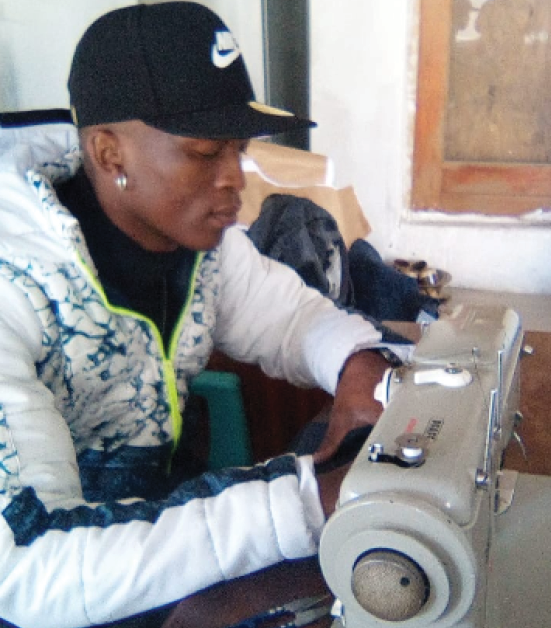
“In 2015, a man broke into the place we used as a storage facility for stolen goods. I caught up with him a few days later, when he was selling our things in Alexandra.
“I took him to my gang members, and he was beaten to death. When the police investigated the case, they charged me as the person who initiated the assault,” says Mavuso.
When in prison, he joined the prison gang. When he saw his friends being released before him, he realised that the only way to get out of prison was to change his ways and leave the past behind him.
The first step was to complete matric. Mavuso says: “I left school in Grade 11, so I enrolled to finish high school. While I was busy with that, I took the skills training courses. One of them was sewing.”
When he was released from prison, he looked for a job. “I found a couple of jobs, but potential employers would do a fingerprint check. When they found out about my criminal record, I would not get the job.“
Having promised himself that he would never go back to a life of crime, Mavuso used his sewing skills to make face masks when the Coronavirus Disease hit the country. He then expanded his operations and began making dresses. These caught the eye of a boutique store owner, who asked him for samples.
Mavuso now also sells to people who come directly to him. He says he was able to turn his life around thanks, in part, to anger management classes held by the Department of Social Development.
“I got into the life of crime in 2011 but now I am able to avoid situations that would send me back to prison as I am equipped with anger management skills,” Mavuso says. He advises young people to take part in these programmes.
Local supermarkets ‘fancy’ local detergent
Local supermarkets ‘fancy’ local detergent LondekileFancy Monama’s hobby has turned into a thriving business.
Fancy Monama is the founder of Bluu – a brand with a range of detergents.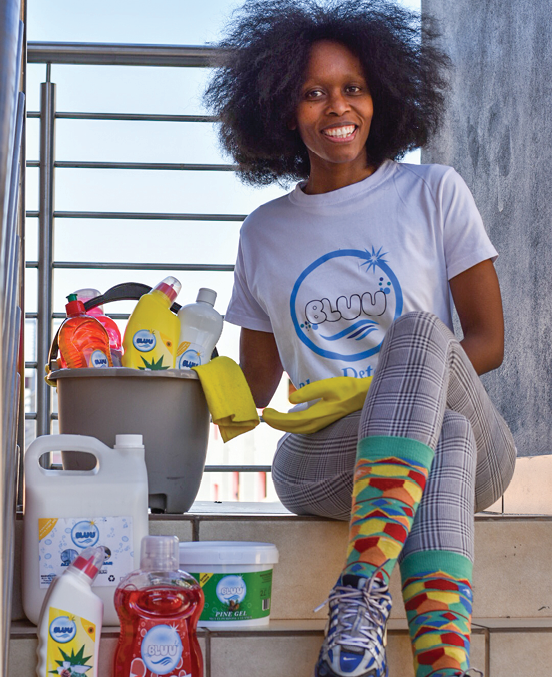
The industrial engineer from Attridgeville in Tshwane always dreamt of owning her own product.
Monama’s dream became a reality about six years ago, after watching YouTube tutorials about making detergents.
“After spending nine years working in different manufacturing industries, I knew I wanted my own manufacturing plant. I had no idea what products I would manufacture,” she says.
At the beginning of 2020, with start-up capital of R3 000 and a mentor training her, she decided to make products to sell to the public.
“Detergents are one of the most used products in the world. They don’t depend on social class, location, age or race and not seasonal,” Monama's explains.
Her range of products includes dishwashing liquid, thick bleach and bubble bath. Currently working alone, with an occasional delivery assistant, Monama supplies local supermarkets in Atteridgeville, households in and around Tshwane and outside Gauteng.
”The highlight of my business was getting my products in stores with popular brands. The fact that my products are moving, even when next to known brands, is very exciting,” she says.
Monama adds that access to the market is difficult and her success came with its fair share of challenges. She advises young people to pursue their dreams. “Young people have so many bright ideas but are limited by fear and the famous ‘I do not have funding line’. They must just do it, do it scared, do it with no funding,” she says.
Monama aims to own a manufacturing plant, employing graduates and young people, while also contributing to community building and empowerment through skills development programmes.
Lwazi Msipha makes it big on Cartoon Network
Lwazi Msipha makes it big on Cartoon Network LondekileLwazi Msipha, has turned his love for cartoons into a full-time career. He has created, written and animated a new show called My Cartoon Friend. The show is being aired on American cable television channel Cartoon Network.
The 13-episode production is about the friendship between a 2D version of Msipha and Themba, a cartoon character. The two co-existing in the same world learning to live with each other as their friends.
Msipha’s big break came after attending an animation festival in France in 2018. At the time he was still a first year student at the Animation School pursuing a Diploma in animation. He was able to attend the festival thanks to funding received from the National Film and Video Foundation and a French company that worked closely with the University of Witwatersrand's Digital Lab Africa.
Msipha says while attending the conference in 2018, he also had a one-month residency in France. He used the festival and the time spent in France to market himself and his work to members of Cartoon Network. In 2020 Msipha’s hard work paid off.
“During the hard lockdown I received an email from Cartoon Network asking me to create a show that inspires kids and makes them laugh. I had no prior experience but did not let that stop me. I managed to deliver an awesome show through a sponsorship from Netflix."
Masipha says he has always been passionate about cartoons and his love for the art developed even more after watching an animated show called Dragon Ball Z.
He says when Dragon Ball Z aired on the television, he noticed that all the children in his neighbourhood enjoyed the show so much they would stop playing on the streets.
This prompted Msipha to do further research on the art of animation and develop a career from it. His mother also encouraged him to study animation and supported him.
Msipha is set to jet off to France soon, where he will be pursuing a Masters in animation at the Gobelins School of Imagery in Paris.
He says he would like to plough back all the knowledge that he will receive into the South African animation industry.
“I plan on creating a programme that teaches children how to animate, by showing them that it is as simple as using a cell- phone.”
Msipha plans to open an animation studio that tells South African stories.
MDB profile
MDB profile Londekile‘’Delivering just and democratic boundaries’’
Established in 1999, The Municipal Demarcation Board (MDB), an independent authority has continued to deliver its mandate without fear, favour or prejudice.
The MDB’s mandate is derived from the Municipal Demarcation Act (Act No.
27 of 1998) and Municipal Structures Act (Act No. 117 of 1998).
The MDB is mandated to:
- Determine and re-determine Municipal Boundaries
- Delimit ward boundaries for Local Government Elections
- Conduct Municipal Capacity Assessments; to ascertain whether municipalities have the requisite capability to fulfil their constitutional obligations; therefore advice the responsible MECs on allocation of powers and functions between Local and District Municipalities; and
- Provide advisory services on related local Government matters.
Highlights of the MDB
The MDB played an instrumental role to deepen democracy in South Africa through reversal of the apartheid spatial logic, creating boundaries that do not run along ethnic, racial or class lines, integrated settlements, facilitated an equitable service delivery and an inclusive tax-base to foster socio-economic development.
The year 2019, was a watershed period that ushered in the 20 years anniversary of the MDB which also coincided with the sixth national elections and 25 years of freedom in the country. MDB hosted a remarkable conference themed:”20 Years of demarcation, Reflections on Spatial Transformation’’. The significant gathering symbolised the MDB’s continued endeavour to engage thought leaders on how to sharpen the demarcation instrument aligned with the National Development Plan (NDP) to influence effective service delivery.
MDB processes
The Municipal Demarcation Board (MDB) finalised the ward delimitation process in December 2020 and handed over 4468 wards to the IEC to begin with the preparation for the LG election. To this end communities are encouraged to use the Web App developed to assist them to know their wards #KnowYourWards.
The Municipal Outer Boundary Redetermination process will commence after the 2021 Local Government Elections (LGE).
Municipal Demarcation Board (MDB)
For more information:
Contact us on: 012 342 2481
www.demarcation.org.za
Info@demarcation.org.za
Meet enviro warrior Mandlenkosi Nkosi
Meet enviro warrior Mandlenkosi Nkosi UrsulaKnocking on doors looking for work led Mandlenkosi Nkosi to become a thriving businessman and an enviro warrior, advocating for recycling and teaching others how to profit from it. 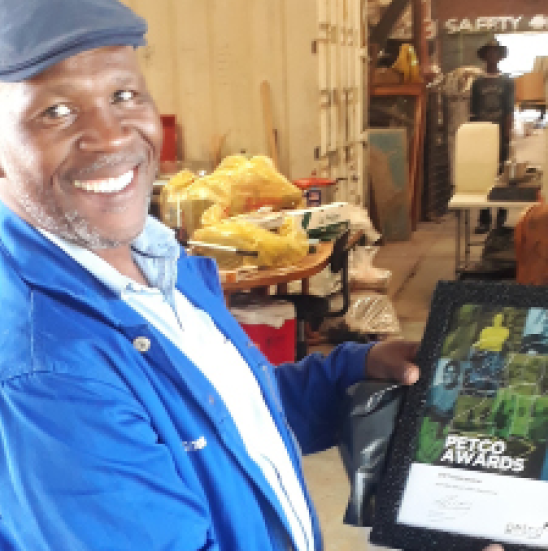
During Nkosi’s unemployment days, he bumped into a number of informal traders and wondered where they were taking the waste they had collected.
“I decided to follow them and they eventually taught me the business of recycling.”
He stopped looking for work, built a trolley and at the end of the day, when he was able to bring home groceries, his wife joined joined in to help him.
“I gained more confidence and started collecting from my neighbourhood. I would pull the trolley in front and my wife would push at the back, we were a team,” he says.
Nkosi caught the eye of an official from the City of Ekurhuleni who helped get him work at a nearby transfer station. That was a huge milestone as it led to work at other local transfer stations. The couple bought an old bakkie, which helped them reach and service other stations, expanding their business and creating jobs.
One man’s trash…
Today, Nkosi has two recycling sites - one in Idutywa, Eastern Cape, where he employs 12 people, producing an average of two tonnes of recycled material a day. The second site in Boksburg, Gauteng, has a staff of six and an average production of a tonne waste a day. Nkosi sells plastic products to clients in Benoni, Boksburg, Butterworth and Mthatha. He also has a free training programme called Amathandamvelo, which teaches the importance of taking care of the environment and making money from recycling.
“Before the Coronavirus Disease, I trained over 500 people and continued mentoring them via my national recyclers’ WhatsApp platform. My target is to train at least a 1 000 people per province, per year,” he says.
The Gauteng Department of Agriculture and Rural Development trained Nkosi and his employees on safety and first aid and supplied him with bulk bags and steel cages.
Nkosi also received funding from recycling company PETCO.
For more information visit www.mnfrecycling.co.za, or WhatsApp Nkosi at 061 537 2237 or email mandle@mnfrecycling.co.za
New clinic services Barberton residents
New clinic services Barberton residents LondekileResidents of Umjindini township in Barberton, Mpumalanga, no longer have to travel long distances for primary healthcare services thanks to a new state-of-the-art clinic that opened to the community recently.
The new Cathyville clinic, built by Barberton Mines, at a cost of R15.4 million, was officially handed over to the community by the Minister of Mineral Resources and Energy, Gwede Mantashe, and Mpumalanga Premier Refilwe Mtsheni-Tsipane.
The clinic was built as part of the Social and Labour Plan to impose responsibilities on mines to develop the communities in which they operate.
“A Social and Labour Plan is a document that mining companies are required to submit to the Department of Mineral Resources and Energy when submitting their applications for mining rights. It is a collection of promises that the mines make, which become legal commitments once the application is approved by the department,” the Minister explained.
He added that the Social and Labour Plan must complement the work done by municipalities to improve the living conditions of residents and make an impact in those communities.
“When you hand over a project like this to the community, it is no longer a project of the mine nor government, but it belongs to the residents. They must own and protect it to ensure that they continue to benefit from it,” he said.
Community member, Joyce Nkosi, said the clinic was well received by the community and is saving lives by providing quality healthcare services to those in need.
Services at the clinic
The clinic has five consulting rooms and offers various services, including a mother and child programme through which babies are screened and immunised and pregnant women are given medical attention. The clinic provides services for mental health-related cases and patients who need HIV/AIDS testing.
According to the Mpumalanga Premier’s office, the clinic ,which treats about 150 patients per day, will benefit 1 700 residents.
The clinic will also serve as a Coronavirus Disease vaccination station.
R11 billion allocated for jobs
R11 billion allocated for jobs UrsulaThe Economic Reconstruction and Recovery Plan is helping the country’s economy and people recover from the COVID-19 pandemic and recent unrest. 
The Presidential Employment Stimulus Package has allocated an additional R11 billion to support employment, as part of the Economic Reconstruction and Recovery Plan (ERRP).
President Cyril Ramaphosa recently made this announcement when responding to questions during a sitting of the National Assembly.
He said initiatives such as the Basic Education Employment Initiative will continue, with the aim of creating jobs for the youth who have assisted in schools as part of the response to the Coronavirus Disease (COVID-19) pandemic.
Support for small-scale farmers and workers in the early childhood development sector also forms part of the stimulus package.
“The Presidential Employment Stimulus Package has supported close to 700 000 job opportunities to date, and largely to young people,” he said.
The country’s unemployment statistics have highlighted the urgent need for the public and private sectors to be actively involved in implementing the ERRP.
Results for the second 2021 Quarterly Labour Force Survey (QLFS), recently released by Statistics South Africa, showed that unemployment has increased by 1.8%.
“The statistics released for the second quarter of this year are a reminder of our unemployment crisis and the extent of poverty in our country.
“While the interventions contained in our ERRP are necessary and significant, I will say now that they are not enough,” said the President.
He added that job creation can no longer be the mission of government alone.
“The time has now come for us to assess how far we have come, to reflect on the choices that confront us as a nation, and to take bold actions to achieve economic progress,” said the President.
Faster-growing economy
The ERRP is government’s blueprint for building a more inclusive equal, resilient and faster-growing economy.
President Ramaphosa said government will roll-out infrastructure, increase local production and expand the country’s energy generation capacity.
“We are implementing a range of structural reforms to ensure that we have a reliable power supply, cheaper data, abundant and clean water, efficient-running ports and good rail infrastructure.”
Minister of Mineral Resources and Energy Gwede Mantashe recently published revised regulations for energy-generating projects.
“This was a defining moment in energy generation in our country. This will not only alleviate the immediate energy supply shortfall, but will also lead to massive investment in new projects and stimulate growth,” said President Ramaphosa.
Energy generation will provide certainty to investors that the current electricity challenges will be resolved. This will enable investors to confidently invest in new factories, mines and other initiatives.
President Ramaphosa stressed government’s commitment to ensuring that the National Ports Authority is an independent subsidiary of Transnet, which will improve the efficiency of port operations and enable greater private investment in port infrastructure.
Social Relief of Distress Grant
The violent unrest, that occurred in KwaZulu-Natal and Gauteng in July, dealt a further blow to the country’s economic recovery.
To support those who were left vulnerable by the pandemic and unrest, government reinstated the Social Relief of Distress Grant until March 2022.
“Thus far, close to 12 million people have applied for the Social Relief of Distress Grant and the South African Social Security Agency has started processing these and paying out,” said President Ramaphosa.
The interventions by government have sustained millions of jobs, prevented the closure of a number of businesses and provided relief to many vulnerable people.
Reneilwe Aphane serves his ‘Kasi Menu’
Reneilwe Aphane serves his ‘Kasi Menu’ LondekileThe absence of food delivery apps in townships prompted Reneilwe Aphane to create Kasi Menu.
Aphane says entering the industry was not easy.
"In the township economy people gravitate towards independent local traders. The mistake some companies make is trying to offer township residents deliveries from popular franchises. We have instead involved local businesses with some of the most popular spots in the different townships.”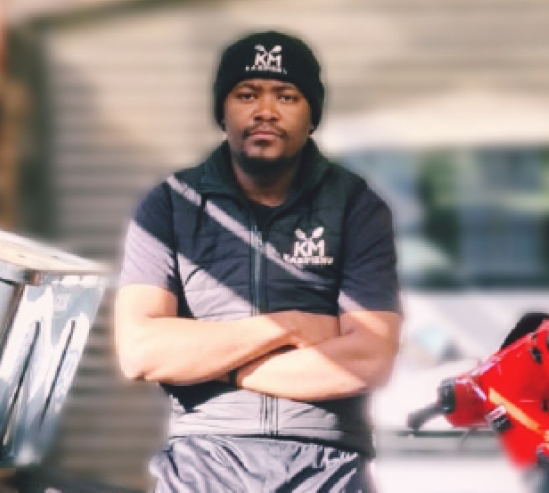
Kasi Menu works like any other food delivery app. The customer downloads the app for free from any app store, registers and has access to nearby traders.
This is not without its fair share of challenges. ”The biggest challenge is terrain management. A lot of places in the township are not properly registered on Google Maps, which we use for directions.
”This was a big problem, especially in cases where the driver was not familiar with the area.”
Aphane says since its inception, the app has seen a steady increase in users.
”This type of innovation allows customers access to known outlets and new ones that they were not aware of. This means the number of orders will increase, which is good news for local dealers. The number of people using the app will also improve.”
Kasi Menu is such a success with locals, that Aphane and his team have added a grocery function to the app.
”This will operate in the same manner. Customers will also bypass queues and purchase groceries on demand online. So far, we have Big Save supermarket on board and are looking at adding more,” says Aphane.
The app is available both on Android and iOS devices, as well as via www. kasimenu.com
SA salutes whistleblowers
SA salutes whistleblowers Ursula
Over the course of the three years, since the Commission of Inquiry into State Capture started its work, we have heard of the lengths to which the perpetrators of corrupt acts have gone to conceal their misdeeds.
It has been an extremely complex undertaking to unravel the networks of influence that enabled corruption. Among other things, vast webs of front companies were established to move funds around and disguise payments made to politically-connected individuals.
The same patterns have been seen in a number of investigations into corruption being undertaken by the Special Investigating Unit (SIU) the Directorate for Priority Crime Investigation, the National Prosecuting Authority's (NPA) Investigating Directorate and others.
As these investigations progressed and the net began to close on implicated individuals, we have seen witnesses being threatened, their families intimidated, being forced into hiding, and even killed.
The murder of Babita Deokaran, a senior finance official in the Gauteng health department, is a stark reminder of the high stakes involved in our collective quest to remove this cancer from our society.
While we do not yet know the motive for her murder, she was a key witness in a SIU investigation into the procurement of personal protective equipment in the department.
The SAPS and the private security teams who apprehended seven suspects recently are to be commended for their work. The docket has been transferred to the Hawks, and the investigation will yield further information on why Ms Deokaran was murdered.
Regardless of the circumstances behind this tragedy, Ms Deokaran was a hero and a patriot. As are the legions of whistleblowers who, at great risk to themselves, help to unearth instances of misdeeds, maladministration, cronyism and theft.
Without their brave and principled interventions,
we would be unable to unmask those committing corruption.
Though much focus in recent times has been on whistleblowers in the public sector, we also owe a debt of gratitude to those in the private sector whose actions receive less attention, but are equally important.
Whistleblowers are important guardians of our democracy. They raise the alarm against unethical acts and practices in government and organisations.
They speak out in good faith and with a reasonable expectation not only that action will be taken on their disclosures, but that they will be protected and not suffer victimisation or prejudice.
In South Africa there is extensive legislative protection for whistleblowers, including through the Protected Disclosures Act, Labour Relations Act, Companies Act, Protection against Harassment Act, and the Constitution itself.
In addition, the Department of Justice and Correctional Services, working with other law-enforcement agencies, administers the Office of Witness Protection to provide support to vulnerable and intimidated witnesses in any judicial proceedings.
Entering witness protection is voluntary, and neither the SAPS nor the NPA can compel a witness to do so.
Should a witness receive threats to their life or feel unsafe, they have to inform investigators and apply for admission to the programme. This successful programme has played a key role in securing successful prosecutions since its inception, particularly with regards to organised crime.
It is clear that as the fight against corruption gathers momentum, we need to urgently review our current approach not only to witness protection, but also to the broader protection of whistleblowers.
While numerous systems are in place to enable whistleblowers to report anonymously, we need to tighten up existing systems and provide greater support to those who publicly come forward with information.
As society, we need to identify where existing laws and policies are inadequate in protecting the livelihoods, reputations and safety of whistleblowers – and work together to address these.
The intent of the criminals who target whistleblowers is not only to silence particular individuals – it is also to send a message to other potential whistleblowers.
Day by day, brave South Africans like Babita Deokaran are standing firm that they will not be party to corruption and they are prepared to bear witness against it.
As the South African people, we salute her and all the whistleblowers in the public and private sectors who are exposing corruption to the harshest of glares. They are doing so without expectation of acknowledgement or reward. Theirs is the highest form of public service.
We cannot let them down. We must, and we will, ensure that their disclosures result in prosecutions and do much more to ensure that they are protected from harm.
As South Africans, we want to send a strong a message that we will not be intimidated. Those behind the killing of witnesses and whistleblowers will be arrested and face the might of the law, as will all who are found guilty of the very corruption these assassins are trying to cover up.
Sasolburg teachers lead in vaccination drive
Sasolburg teachers lead in vaccination drive UrsulaTeachers are leaders in communities and must lead by example, by encouraging South Africans to get vaccinated. 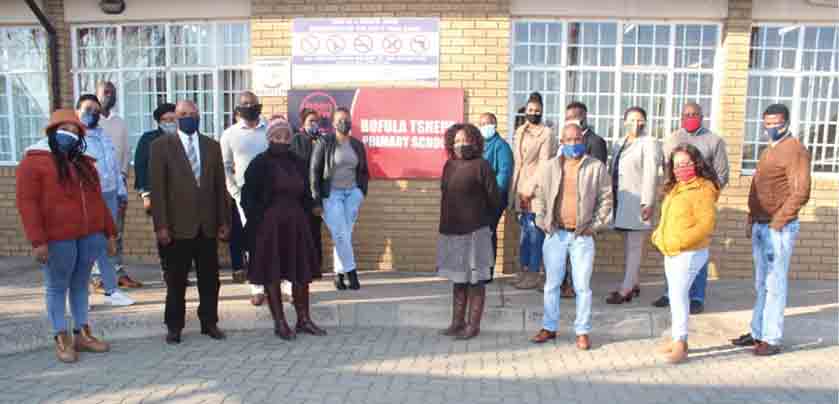
This is the sentiment of Principal Ramabesele Isaac Mosholi, of Bofula-Tshepe Primary School, who says almost all of his teachers have been vaccinated against the Coronavirus Disease (COVID-19).
“It is extremely important for all teachers to get vaccinated because we meet learners, parents, colleagues and the community outside of the school every day. If we are not vaccinated, our chances of spreading the virus become extremely high,” he says.
The school has 1 477 learners from grades R to 7, 42 teachers six non-teaching staff, including cleaners and screeners; as well as seven voluntary food handlers.
The school learnt a tough lesson when a number of teachers, including the principal, were infected with the virus.
“Parents kept their children at home because they feared that they would be infected and bring the virus home.
“We had to get the school disinfected. We quarantined and observed all necessary protocols. When we reopened the school, we made sure that learners and teachers regularly sanitised, maintained social distancing and wore masks at all times. We understand the seriousness of this virus,” he says.
The general assistants programme assisted when the teachers were in quarantine, to avoid a backlog in the syllabus.
“Our chances of contracting the virus and spreading it are very slim now that we’re vaccinated. The chances of children infecting others and their parents are slim too, and this will assist in flattening the curve,” he says.
Now that all the teachers have been vaccinated, Bofula-Tshepe can go back to focusing on the learners. For the 2020 academic year, the school produced a 95% overall pass rate.
Mosholi is hopeful that the school will maintain a more than 90 % pass rate this year.
Spot childhood cancer warning signs
Spot childhood cancer warning signs UrsulaChildhood Cancer Awareness Month, which takes place every September, creates awareness about many childhood cancers. 
Childhood cancer is on the rise globally, with an estimated one in 408 children worldwide diagnosed with cancer before the age of 15.
According to Taryn Seegers, the Communications Coordinator at the Childhood Cancer Foundation of South Africa (CHOC), it is believed that two thirds of children with cancer do not receive treatment and often those who do are already in the late stages of the disease.
Since 2011, CHOC has been working with the Department of Health and traditional healers to provide health professionals, healthcare workers, traditional healers and communities with knowledge of childhood cancer.
“These individuals are taught the Siluan early warning signs and learn how to demystify myths and stigma in communities,” says Seegers.
The Siluan early warning signs are:
- Seek: Medical help for early, persistent symptoms.
- Eye: White spot in the eye, new squint, new blindness, bulging eyeball.
- Lump: Abdomen and pelvis, head and neck, limbs, testes and glands.
- Unexplained: Prolonged fever over two weeks, weight loss, pallor, fatigue, easy bruising or bleeding.
- Aching: Bones, joints, back and easy fractures.
- Neurological signs: Change or deterioration in walk, balance or speech, regression of milestones, headache for more than a week with or without vomiting and an enlarged head.
Childhood cancers
Childhood cancers are different from cancers affecting adults. They tend to occur in the organs of the body, look different under the microscope and respond more favourably to treatment, says Seegers.
“Cure rates for most childhood cancers are much higher than those for most adult cancers. Today, in developing countries, the majority of childhood cancers can be treated very effectively, and between 50% to 60% can be cured. In high-income countries, the survival rate can be between 85% to 90%.”
More children need to be diagnosed while the disease is still in its early stages and receive the correct treatment – at specialised treatment centres from appropriate specialists – if the survival rate is to be improved.
For more information, contact CHOC’s helpline at 0800 333 555 or go to www. choc.org.za
Support for the creative sector
Support for the creative sector LondekileThe Department of Sport, Arts and Culture has begun its inaugural #ForTheRecord information sessions to keep the public informed about its economic recovery and reconstruction efforts for the creative sector.
The initiative comes after the department was repeatedly accused of being unresponsiveness and uncaring towards the creative sector.
Sport, Arts and Culture Minister Nathi Mthethwa says these sessions will be held regularly.
He says the accusations and allegations levelled against the department are not backed up by facts, and that the department has. made verifiable documents available to the public on its website. The documents include a list of beneficiaries who have received the COVID-19 Relief Fund.
According to the Minister, it is due to limited resources that the department is unable to support every role player in the sector who is in need of assistance.
“If anything, monies spent thus far (August 2021) are just under R700 million. That is over half a billion rand. This translates into just under 65 000 beneficiaries. By all accounts, this cannot be counted as a small feat,” he says.
Minister Mthethwa says the department implemented a communication and outreach plan to mobilise role players so that they can apply for the relief funding.
He adds that the department is currently focused on providing relief funding, but it will be part of its medium - long-term initiative, focus on the economic recovery and reconstruction of the sector.
A list of persons and organisations that have benefited from the funding is available on the department’s website: www.dac.gov.za / www.srsa.gov.za
The ABC of Alzheimer’s disease
The ABC of Alzheimer’s disease LondekileHow to spot Alzheimer’s and what to do to manage the effects of this debilitating disease.
Alzheimer’s disease, the most common form of dementia, is the name given to a group of conditions where memory, thinking, behaviour and emotion are affected in the brain.
Many South Africans are affected by this condition, but little is known about this type of mental illness.
Ntokozo Ngcobo, a psychiatrist at King Dinuzulu Hospital in Durban, says dementia often affects the elderly. She says that those who suffer from this illness often experience memory loss.
The symptoms of Alzheimer’s disease often develop gradually, but become more severe with time.
“Alzheimer’s disease causes people to lose their ability to recognise familiar places. It’s common for a person living with this form of dementia to wander off or become lost or confused about their whereabouts. Six in 10 people living with dementia will wander off at least once,” she says.
Other symptoms of Alzheimer’s disease include:
- Difficulty solving problems and planning.
- Struggling to finish familiar tasks.
- Difficulty with time and space.
- Unpredictable and unusual behaviour.
- Personality and mood changes.
People diagnosed with dementia also tend to rummage through drawers. Alzheimer’s South Africa, a non-governmental organisation, says this happens when a person with Alzheimer’s hides an object, then forgets where it is. Other people appear to rummage through items that are familiar and reassuring to them. The desire to have familiar things around them can sometimes be combined with hoarding extra items, whether it’s food, paper or clothes.
How to manage Alzheimer’s disease
There is no known cure for Alzheimer’s disease, but it can be managed with medication and engaging in activities such as gardening.
According to Alzheimer’s South Africa gardens can be wonderfully therapeutic for everyone.
For more information, visit Alzheimer’s South Africa's website at www.alzheimers.org.za or call 011 792 2511. Alternatively, you can visit the nearest public health facility in your community.
The beauty of business
The beauty of business LondekileThe National Development Agency (NDA) and Mfesane, a non-governmental organisation (NGO), has donated 10 mobile beauty salons to the Saldanha Bay and Bergriver local municipalities in the Western Cape.
 A beneficiary of the programme and the owner of Mama’s Beauty Bar, Ilse Masdoorp (26), says the mobile salon helps her feed her two children and support her husband, who was previously the breadwinner of the family.
A beneficiary of the programme and the owner of Mama’s Beauty Bar, Ilse Masdoorp (26), says the mobile salon helps her feed her two children and support her husband, who was previously the breadwinner of the family.
NDA Chief Executive Officer Thamo Mzobe says the recruitment process identified skilled young people via the Mfesane Velddrif and Saldanha Bay Youth Café databases.
“The 10 entrepreneurs underwent training for three months to learn beautician skills and how to run a successful business. In July, they received their start-up kits to begin their mobile businesses.
“Overall, this programme will improve the livelihoods of about 50 people, including the participants’ dependents,” says Mzobe.
Masdoorp explains that she learnt how to cut and colour hair as well as basic skills in leadership, entrepreneurship, book-keeping, business registration and compliance, mobile literacy, marketing and job readiness.
The mobile salon owners will also attend a hairdressing course at the Image Exact Hairdressing and Beauty Academy for six weeks, which they will pay a portion for.
The CEO of Mfesane, Yolandi Africa, says: “Many candidates are already established with an existing client base in their communities. The locally sourced start-up kits will only propel their businesses to ensure that they have all they need to provide full services to their clients.”
Another beneficiary of the programme and owner of Natural Queen Mobile Salon, Camoren Titus, says the training and mobile salon is going to help her grow her business.
“I’ve been able to broaden my thinking and I am now equipped with the necessary skills. I am already an established natural hair stylist, but the lessons and equipment will allow me to offer more services to my clients,” Titus says.
To find out more about the partnership between Mfesane and the NDA, visit www.mfesane.org.za or call 021 945 3992/5.
Tsakane Matsoga to become main player in potato farming
Tsakane Matsoga to become main player in potato farming UrsulaA trial partnership between small- scale farmer Tsakane Matsoga, Potatoes SA and the Limpopo Department of Agriculture and Rural Development (LDARD) is benefitting the province's farming comm-
unity. 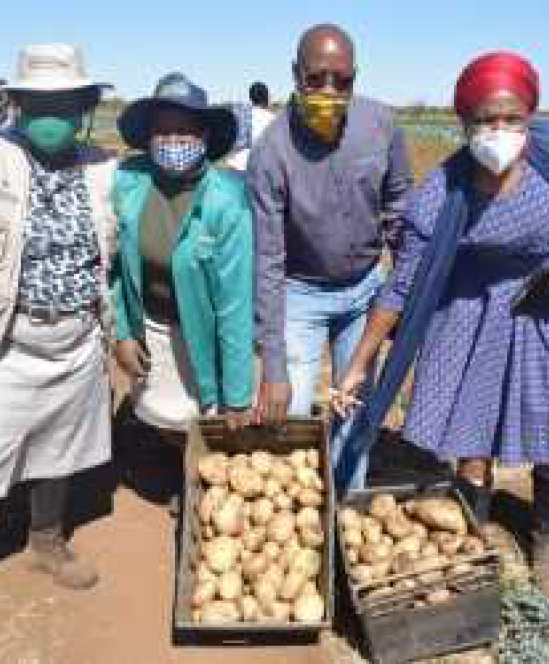
Matsoga (48) has produced R76 000 worth of potatoes on less than a single hectare of her farm in Bochum. Potatoes SA provided fertilisers, technical education on chemical use and best farming practices to Matsoga and farmers from the villages of Ga-Mashalane and Gemarkte, also in Bochum.
“Following the success of the trial, we have increased the size of the project from less than a hectare to 6.5 hectares.
“The partnership with Potatoes SA and LDARD has helped teach me about the best fertilisers and chemicals and how to check for soil moisture using a thermometer,” says Matsoga.
The department supplied the farmers with potato seeds and pesticides.
Matsoga says that she was able to harvest 2 320 pockets of Mondial potatoes.
Mondial potatoes make up 51% of potato cultivation across the globe, with only 1.5% of that cultivated in South Africa.
The farmers signed a five-year agreement with Potatoes SA, that will see them receive production inputs to the value of R500 000 each year. In the first year, the farmers will get these inputs for free. In the second year, they will pay for 25%, followed by 50% (third year), 75% (fourth year) and the full amount in the fifth year.
The project is part of LDARD's Revitalisation of the Agriculture and Agro-processing Value Chain (RAAVC) plan. The plan sees LDARD and Potatoes SA signing a memorandum of understanding to help develop the potato farming sector in Limpopo.
“The aim is to provide a comprehensive technology transfer and enterprise support to farmers in aid of the RAAVC commodity focus approach,” says LDARD's spokesperson Joshua Kwapa.
He adds that the department’s RAAVC Plan will sustain and strengthen the province’s competitiveness in the primary production of high-value agricultural commodities.
Limpopo accounts for 21% of the total area under potato production in the country.
Farmers looking to participate in the programme can visit www.ldard.gov.za
Vaccinate: Help healthcare workers save lives
Vaccinate: Help healthcare workers save lives UrsulaAs South Africa continues to fight the Coronavirus Disease (COVID-19) pandemic and fears of a fourth wave surface, Dr Davianne de Bruin says the public’s responsible actions are critical when it comes to saving lives. 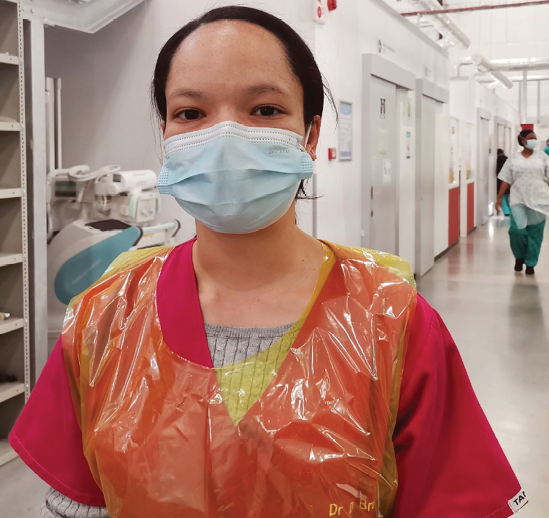
Dr de Bruin has worked at the Western Cape’s Brackengate Hospital of Hope during most of the pandemic.
The field hospital was commissioned in July 2020 to ensure the province’s healthcare system could respond during COVID-19 peaks. Since then, its employees have saved thousands of lives. In its first year, it recorded 4 346 admissions, of which 3 390 recovered and 533 were transferred to tertiary institutions for further care.
After her nine-hour shifts, Dr de Bruin is relieved when she can go home to rest. Working on the frontline, her hope for each day is to save lives. Her hardest moments are when she hopes a patient will recover, but they do not. “It’s really not easy. But what brings me joy, is watching those who do recover and getting to tell them that they’re going home to their loved ones.”
Healthcare workers, who put their lives on the line daily, need the public’s support, stresses Dr de Bruin.
“People can support us by getting vaccinated. This virus is vicious and we can’t predict how it will affect you. Vaccination is your best weapon to fight it.”
The public can also support healthcare workers by continuing to practise safe behaviour and remaining vigilant. Stick to the basics by wearing a mask, social distancing, sanitising your hands and avoiding crowds, she says.
“Being vaccinated does not guarantee that we will not get COVID-19, but it can prevent severe disease that can result in hospitalisation and death. In the greater scheme of things, vaccines help to limit the burden of disease, not only for the public, but for the healthcare system and workers too,” says Dr de Bruin.
She stresses that without the public’s support, overcoming the pandemic will not be easy as healthcare workers are experiencing burnout and exhaustion. By vaccinating, the public can help to relieve the daily pressure they face.